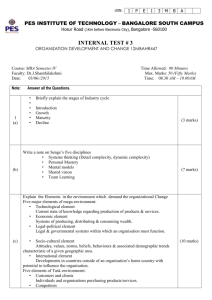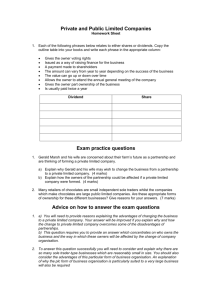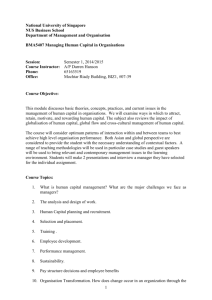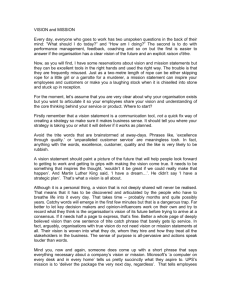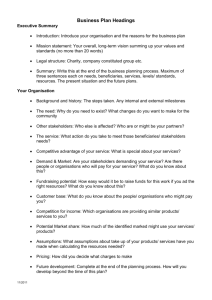Assessment * Learning, Knowledge and Effective Performance *
advertisement
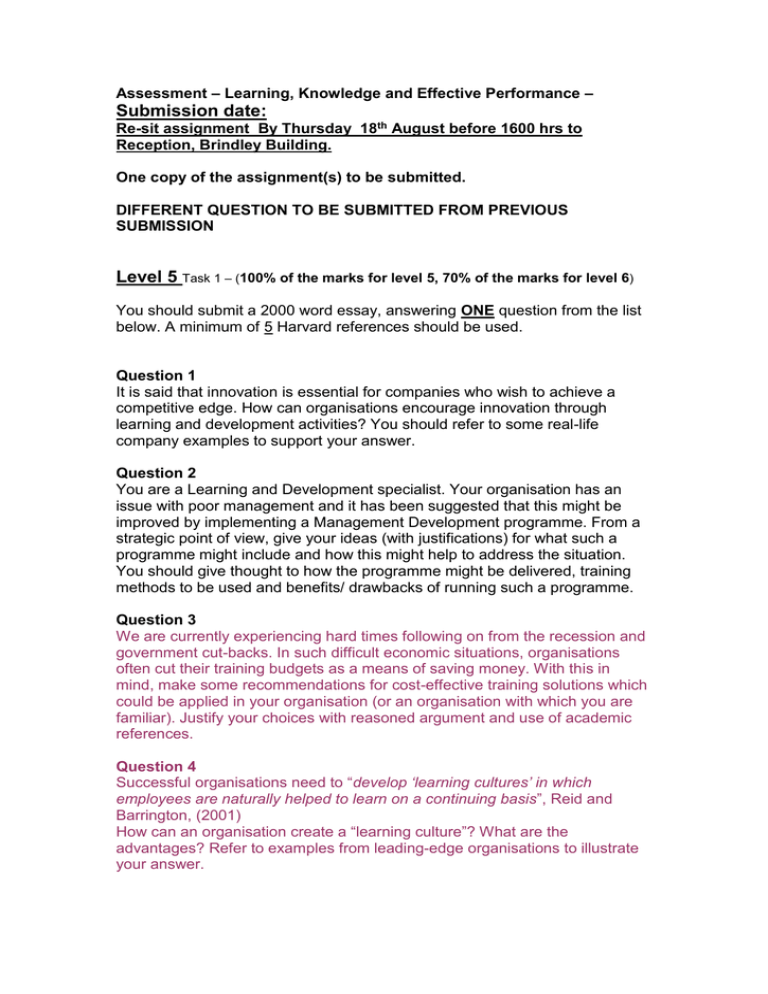
Assessment – Learning, Knowledge and Effective Performance – Submission date: Re-sit assignment By Thursday 18th August before 1600 hrs to Reception, Brindley Building. One copy of the assignment(s) to be submitted. DIFFERENT QUESTION TO BE SUBMITTED FROM PREVIOUS SUBMISSION Level 5 Task 1 – (100% of the marks for level 5, 70% of the marks for level 6) You should submit a 2000 word essay, answering ONE question from the list below. A minimum of 5 Harvard references should be used. Question 1 It is said that innovation is essential for companies who wish to achieve a competitive edge. How can organisations encourage innovation through learning and development activities? You should refer to some real-life company examples to support your answer. Question 2 You are a Learning and Development specialist. Your organisation has an issue with poor management and it has been suggested that this might be improved by implementing a Management Development programme. From a strategic point of view, give your ideas (with justifications) for what such a programme might include and how this might help to address the situation. You should give thought to how the programme might be delivered, training methods to be used and benefits/ drawbacks of running such a programme. Question 3 We are currently experiencing hard times following on from the recession and government cut-backs. In such difficult economic situations, organisations often cut their training budgets as a means of saving money. With this in mind, make some recommendations for cost-effective training solutions which could be applied in your organisation (or an organisation with which you are familiar). Justify your choices with reasoned argument and use of academic references. Question 4 Successful organisations need to “develop ‘learning cultures’ in which employees are naturally helped to learn on a continuing basis”, Reid and Barrington, (2001) How can an organisation create a “learning culture”? What are the advantages? Refer to examples from leading-edge organisations to illustrate your answer. Question 5 Identify 3 key areas which you feel will impact on the future of learning. What should organisations do in order to meet these challenges? Support your answer with academic references and real-life company examples. Semester 1 questions and some SURF Colleges 1 Evaluation of training and learning can be an ad hoc and half hearted affair, based mainly on the distribution of “happy sheets”. Given the vast amounts of money spent on training and development in the workplace, outline some useful recommendations on how training can be evaluated in a meaningful way. 2 “Continuous Professional Development (CPD) is a process by which individuals take control of their own learning and development, by engaging in an on-going process of reflection and action.” (Megginson and Whittaker, 2003). How does your own organisation (or one with which you are familiar) encourage CPD? How can CPD be made to be both effective and relevant –to both the individual and the employer? 3 Employers often treat expenditure on training as a cost rather than a benefit. Should employers foot the bill for training – or should it be the responsibility of Individuals – or the Government? Discuss with reasoned argument, the case for who should fund work-related training and learning activity? 4 Following on from the Leitch Review, 2006, the Government has focused on ways of reducing the skills gaps that exist in the UK workforce. Critically evaluate some of the initiatives used to try and improve the skills in the UK workforce, and discuss whether they have been, or are likely to be effective. 5 Is student attendance at College an outdated idea? With the push for elearning and the introduction of technology into the learning arena, is there still a need for traditional ways of teaching? Argue the case for (or against) the use of technology as the best means of learning. You should refer to real life company examples to support your case. (NB The above 5 questions have been previously approved by the External examiner) RESIT ASSIGNMENT – LEVEL 2 AND LEVEL 3 For the resit at level 2 you should select a different question from Task 1. For those resitting Level 3 – this cannot be a question that you have answered previously, you must select a different question. Level 2 2000 words Level 3 3000 words You should cite at least five academic references, using the Harvard Referencing System. Assignment word count Word count should be to within 10% - no penalty up to 10%. 11-20% excess = 10% reduction in the marks, 21-30% = 20% reduction, 31% plus = work will be capped at a pass grade. Assessment - Learning, Knowledge and Effective Performance – Level 3 At level 3, You have 2 Tasks to complete. One question taken from the list in task 1 above, worth 70% of the marks PLUS the question in Task 2 below, worth 30% of the marks. Task 2 – 30% of the marks Write a 1000 word critical review of 2 contemporary academic/professional articles, relating to learning and development in the workplace. These will be given out during the module. Harvard referencing should be used. Assignment submission arrangements. Submission Time and Date: Tuesday 3rd May 2011 You should hand in one copy of your assignment by the time and date above to the appropriate ‘hand-in location’ at the Business School Receptions on either the second floor Brindley Building, B227 or K166, Octagon, Beaconside as specified above. The Brindley reception is open Monday to Thursday 9.00am to 6.00pm and Friday 9.00am to 4.30pm. The Octagon reception is open Monday to Thursday 8:45am to 4:30pm and Friday until 4:00pm. Fill in the Business School front cover (staple together with your assignment). This must be date stamped. MAKE SURE that you fill in all the relevant details on this form (these are given above!). One copy of the front sheet, date stamped, will be returned to you by the Office. This is your receipt, keep it. You can submit work by post, but you must send it recorded delivery, it must be postmarked two days before the deadline date and a copy must be kept by you in case it is lost in the post. Faxed assignments will not be accepted. There has been an important change to the academic regulations that will come into force for all on-campus and UK partner students’ from this academic year – September 2010/11. In essence, if you fail to submit any assessment for a module you will be given a Grade Point N (Fail due to non-submission) for that module and you will no longer have a guaranteed re-sit entitlement. Any further attempt entitlement will be at the discretion of the Award Board. This regulation applies to all undergraduate and postgraduate awards and at all levels. The regulation change has been incorporated into the University’s published academic regulations available on the website at the following links. Undergraduate awards: http://www.staffs.ac.uk/assets/ugrad_mod_fram_tcm44-26763.pdf Assessment guidelines 1. Logical coherence and structure 2. The work should be concise and relevant and the meaning should be clear 3. Logical arguments with sound conclusions should be made 4. Formulation and interpretation of relevant data and information, Effective presentation of the assignment. This also means that the work must be word-processed. It should be neat and demonstrate conventional spelling and grammar. 5. You will be expected to research and read widely, a minimum of 5 different sources should be used in your answer to the question. 6. Sources of information/quotations used in the work should be properly referenced using the Harvard method. Assessment criteria To gain a mark of 70% or over: excellent performance in this assignment The work must meet all criteria shown in notes and guidelines above to an excellent standard. The work will demonstrate a very wide range of reading, research, critical thought and analysis, and a very good understanding of topics and their implications. Use of many examples, data and information in support of your ideas and concepts. To gain a mark of 60-69%: good performance in this assignment The work must meet all criteria shown in notes and guidelines above to a good standard. The work will demonstrate a wider range than average of reading and research, some critical thought, analysis, and clear understanding of topics and their implications. Use of examples, data and information in support of your ideas and concepts. To gain a mark of 50-59%: Average performance in this assignment The work must meet all criteria shown above in notes and guidelines above to a fair standard. The work will demonstrate a larger range of reading than that given for a pass, research, some demonstration of analytical thought, and an understanding of topics and their implications. Use of some examples, data and information in support of your ideas and concepts. To gain a mark of 40-49%: Pass rate performance in this assignment The work must meet all criteria shown above in notes and guidelines above to a fair standard. The work will demonstrate an acceptable range of reading (a minimum of 5 sources per question) and some research, an attempt at critical thought and analysis, but with a limited understanding of topics and their implications. 0-39 % Fail: Assignment performance that does not meet requirements for a pass The work does not meet the guidelines shown above and fails to demonstrate any understanding. The range of reading is minimal and there is no evidence of research, thought and analysis. Work handed in after the deadline will be labelled ‘Late’ and marked at zero, unless you have approved extenuating circumstances. See notes above about non – submission. If you fail to hand in, you are very unlikely to get another chance to resit the module!


